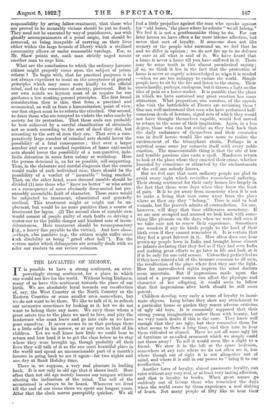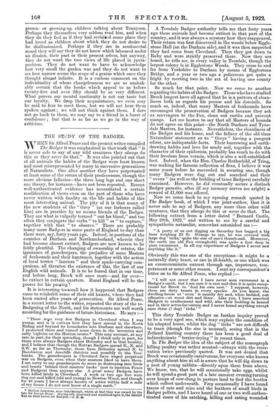THE LOYALTIE - 3 OF /trEMORY.
IT is possible to have a strong sentiment, an over- poweringly strong sentiment, for a place in which one would not live for the world. Without being Irishmen, many of us have this sentiment towards the place of our birth. We are absolutely loyal towards our recollection of, say, the West Country or the North Country or the Eastern Counties or some smaller area somewhere, but we do not want to-be-there. We like to talk of it, to refresh our memories sometimes by looking at it, but we do not want to belong there any more. We envy those whom a great estate ties to the place we used to love, and pity the landowner who must leave and go into exile as we have gone ourselves. It never occurs to us that perhaps there is a little relief in his sorrow, or at any.rate in that of his children. Yet we well know how little we could bear to return and how hard it is to get the class below us to stay where they were brought up, though probably all their lives they will talk of it as the one most beautiful place in the world and spend an unconscionable part of a month's income in going back to see it again—for two nights and one day at Bank Holiday time.
There is, we suppose, a very real pleasure in looking back. It is not only in old age that it shows itself. More often than not old age merely loosens our tongues without altering the inclination of the mind. The call of the accustomed is always to be heard. Wherever we lived till the end of our teens there we spent our longest years. After that the clock moves perceptibly quicker. We all feel a little prejudice against the man who speaks against his "old home," the place where he admits "we all belong." We feel it is not a gentlemanlike thing to do. For our later homes we have often a far more intense affection, but never that sort of loyalty. If someone does not like scenery or the people who surround 1113, we -feel that he and we differ in opinion ; we do not fire up in its defence or care at all what is said of it. We have heard that a home is never a home till you have suffered in it. There may be some truth in this almost paradoxical saying ; so, we think it lies in the fact that the protection of home is never so eagerly acknowledged as when it is needed —when we are too unhappy to endure the world. Simple people love to sit by the fire and listen to the storm. Their case is hardly, perhaps, analogous, but it throws a light on the idea of pain as a home-maker. It is possible that the place in which we have sustained any great emotion has some attraction. What proportion, one wonders, of the crowds who visit the battlefields of France are revisiting them ? One can well understand that men who have performed half- conscious deeds of heroism, signal acts of which they would not have thought themselves capable, would feel moved to return to the scene of their inspiration. Again, in a less degree, those who can but realize as they look back that the daily endurance of themselves and their comrades was in itself heroic would like once more to realize the environment of the triumphant strain. Perhaps in a mystical sense some joy connects itself with every noble emotion. The unaccountable thing is that the site of low and terrible passions also casts a spell. Murderers return to look at the place where they enacted their crime, whether hounded by conscience or attracted by the enchantments of the evil one nobody knows.
But we feel sure that most ordinary people are glad to avoid every sight which revivifies remembered suffering. Their strong sentiment for their early homes lies largely in the fact that those were days when they knew the least of pain. It is to get away from monotony when it is not .
to make a living that men come away from the place where as they say they "belong." Time is said to heal wounds, but the proverb admits of contradiction. No one, however, will deny that time obliterates monotony. If we are now occupied and amused we look back with some- thing like pleasure on the days when we were dull even if we take care not to renew their experience. Sometimes one wonders if any tie binds people to the land of their birth even if they cannot remember it. It is certain that they feel a great interest in it. How often does one hear grown-up people born in India and brought home almost as infants declaring that they feel as if they had seen India and making great efforts to go later in life and look at it if it be only for one cold season. Unless they go they feel as if they have missed a bit of the treasure common to all men, the recollection of the place where first they saw the light. How far unrecollected sights impress the mind doctors seem uncertain. But if impressions made upon the mind of a pregnant woman can affect the physique and character of her offspring, it would seem to follow that first impressions after birth should be still more potent. Children develop very early a sense of loyalty to inani- mate objects. Long before they show any attachment to a particular house or garden they resent adverse criticism of ugly old toys. It is commonly supposed that their strong young imaginations endow them with beauty, but we very much doubt if this is the case. They know well enough that they are ugly, but they remember them for what seems to thorn a long time, and they hate to hear them ridiculed or abused. Have we not all some ugly bit of furniture or so-called ornament which we simply could not throwaway? To sell it would seem like a slight to a friend. We stow it in the loft or the spare bedroom, somewhere at any rate where we do not often see it, but where though out of sight it is not altogether out of i mind, and where it still in our power to "bring it to our recollection."
Another form of loyalty, almost passionate loyalty, can exist without any very real, or at least very lasting affection, and that is loyalty to books. When great names go suddenly out of favour those who remember the days when the world swore by them experience a real sinking of heart. Not many people of fifty like to hear their grown- or growing-up children talking about Tennyson. Perhaps they themselves very seldom read him, and when they do they feel as if they had revisited some place they had loved as children about which they do not desire to be disillusionized. Perhaps if they are in sentimental mood they will say they do not know which laboured under an illusion, their past or their present selves, but anyway, they do not want the two views of life placed in juxta- position. They do not want to have to acknowledge how very small the garden was and they do not want to see how narrow seems the scope of a genius which once they thought almost infinite. It is a curious comment on the individuality of whose changelessness we are so unshak- ably certain that the books which appeal to us before twenty-five and over fifty should be so very different. What proves our mental continuity is not our taste but our loyalty. We chop their acquaintance, we even may be said to fear to meet them, but we will not hear them spoken against ; we will not think against them. I dare not go back to them, we may say to a friend in a burst of confidence ; but that is as far as we go in the way of criticism.



































 Previous page
Previous page